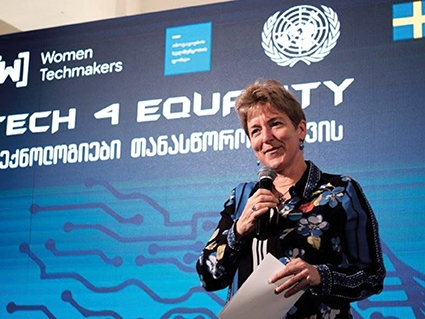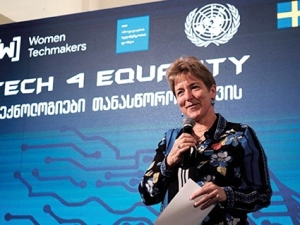Tech4Equality Supports Women’s Empowerment in Tbilisi
On March 5, International Women’s day was marked with the Tech4Equality talk in Tbilisi; aiming to discuss new ways of empowering women and girls by supporting their involvement in the field of technology and science and echoing this year’s theme for International Women’s Day, ‘Think equal, build smart, innovate for change.’ The event was organized by the United Nations in Georgia in cooperation with the Administration of the President of Georgia, Gender Equality Council of the Parliament of Georgia, the governments of Sweden and Norway, and the Georgian civil society organization ‘Innovation Support Fund.’
Georgia is still facing a gender imbalance in the work environment, with the field of science and technology as the most affected area of gender inequality. Women are more represented in social works and the wholesale sector than in technical activities, science, politics and the manufacturing sector. Equality among genders is still not a matter of course, as the statistics show (geostat.ge); and although the sphere of technology and science is a permanently increasing work environment, shaping the future and sustainable jobs, women are still highly underrepresented.
Louisa Vinton, United Nations Resident Coordinator in Georgia, opened the Talk4Equality event and the stage for a row of inspiring speakers. She pointed to the importance of celebrating Women’s Day and to use this day to shine the spotlight on both sides of gender equality, “To celebrate the positive while also seeking solutions for the negative.”
Women in Georgia are well-educated and are still underrepresented in the working environment and particularly in high positions, as well as in the science and technology field. Vinton stated this fact as “shocking” and referred to the need for innovation to equalize this imbalance. “The main challenge is to think equal, end with stereotypes and point to role models for young girls,” she said.
The talk hosted a line-up of inspiring speakers from a wide range of fields who presented their stories and experiences in the tech and science world and what kind of difficulties they had to face in a “male-dominated” world. The speakers counted UN and governmental representatives discussing structural perspectives and official efforts already made, as well as leading women in science and technology offering their rather personal stories and experiences. Among the speakers were Nana Dikhaminjia, Professor of Electronic and Computer Engineering at Ilia State University; Natia Ninikelashviliv, Founder of www.soplidan.ge; Maia Todua, Director of the Abastumani Observatory; David Chechelashvili, a strategy oriented, experienced high-tech entrepreneur, technology commercialization expert; Esma Gumberidze, an activist who advocates for equal opportunities and access for all in Georgia; Mariam Rusishvili, CEO and founder of QuickCash AI; and Ani Tsitsishvili, microbiologist, veterinarian and bio-artist.
The speakers presented positive aspects as well as negative, promoting an easier access for young girls to the tech field. Some speakers pointed to their childhoods, where stereotyping starts either in the families or in schools. “Our education system is still all about remembering, not about self-awareness, thinking and criticizing. We need to be teaching soft skills like curiosity to awaken personal fields of interest apart from typical gender roles,” Chechelashvili said.
Ulrik Tideström, Ambassador of Sweden to Georgia and Armenia, stated, “There will be no sustainable development, welfare, sustainable peace or security if we keep excluding half the population,” and went on to demand more engagement from men to end this exclusion.
All speakers exemplified how they had found new approaches and creative solutions on global problems. Natia Ninikelashviliv, founder of www.soplidan.ge, created a start-up, distributing food products from the regions on the internet in order to ease farmers’ lives from the burden of worrying about sales- building a bridge between rural and urban areas in Georgia. “Promoting equal rights in the technological field will bring a whole new and innovative set of ideas to the field,” she said.
“There are so many strong women who stand out in Georgia, but when you look at the average wage gap and the lack of representation, particularly in political leadership, I think women need to take courage and demand their rights. But we also need to work together with men to ensure and spread the idea that gender equality is a good thing for women as well as men, and at the end for society overall,” Louisa Vinton told GEORGIA TODAY.
By Lisa Maier












